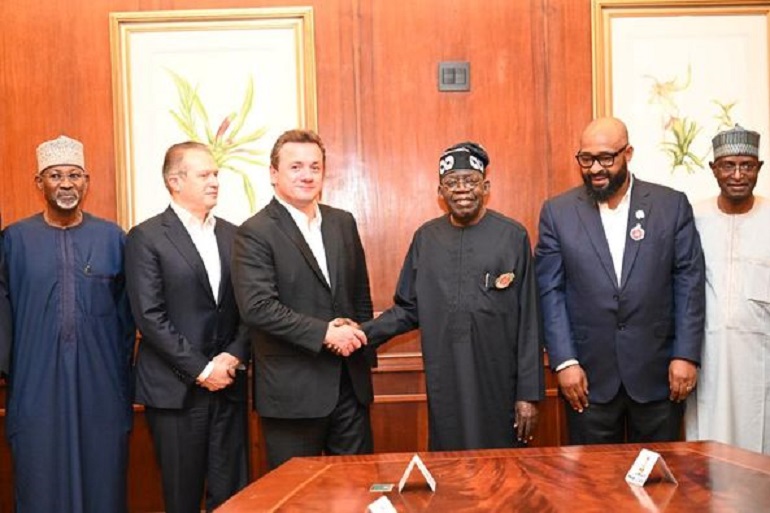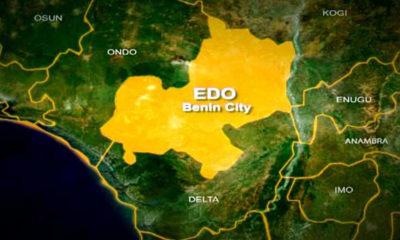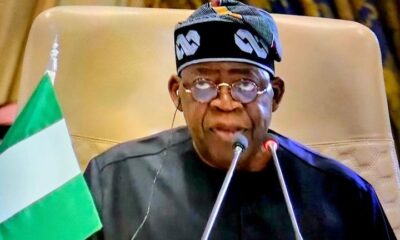Business
Tinubu Moves To Transform Tragedy To Prosperity With Livestock Investment

Nigeria’s President, Bola Ahmed Tinubu is of the view that his administration’s renewed focus in driving international and local investments into livestock sector of the agricultural value-chain will end the crisis of farmer-herder clashes, eradicate hunger and poverty in addition to promoting economic prosperity.
President Tinubu said this Thursday in Rio de Janeiro, Brazil at the signing of a Letter of Intent between the Nigerian Government and the JBS S.A, one of the top three largest meat processing companies globally.
“What we are doing right now is that we are solving a problem that afflicted humanity in that part of Africa, clashes between farmers and migrating cows that have caused some life and bloodshed when there is a modern, civilized way to solve those problems and even bring a successful economy out of it.
ALSO READ: JUST IN: Senate Approves Tinubu’s ₦1.77trn Loan Request
“We are trying to turn a situation of tragedy, hopelessness into economic opportunity, see through problems and see the opportunity that is involved in it.”
The Nigerian leader called on the company to see the considerable potentials in what he called the $2.5billion livestock investment opportunities in Nigeria, especially with its huge population and tap into it, given JBS S.A’s globally recognized expertise in the area of guaranteeing food security.
“We’ve heard so much about you in terms of the reputation, and we believe in the partnership we are forging today.
“Food security is extremely important. As we talk right now, there is hunger. However, there is huge hope. And you are one of those hopes that we are looking at.”
President Tinubu told the JBS top executives that Nigeria is ready to do business with them, assuring them of a good return on their investment.
Prior to his visit to Brazil, President had commissioned a team of Nigerian officials and private sector players to take the advantage of the G20 Leaders’ Summit in Rio to conduct a study tour of Sao Paulo, Brazil and explore the opportunities in livestock development, meat processing, seed development and multiplication for key grains.
In his remarks, the Minister of Livestock Development, Idi Muhktar Mahia, who led the delegation, reported to the President that the team embarked on guided, extended and intensive tours of companies on the scale of their global reach, the integrated nature of their operations as well as the deployment of advanced technology. He added that from their interactions with various companies, JBS S.A. was chosen being the second largest meat processing company in the world with the capacity to process 33,000 cattle daily and over eight million birds daily, using advanced zero-waste practices. The company employs over 200,000 people across its subsidiaries in more than 50 countries in the world including United States, Canada, Mexico, Saudi Arabia among others.
Wesley Batista, founder and President of the JBS group, said the company is the largest employer of labour in Brazil with over $79 billion dollars revenue already in year 2024.
“We are glad to work with Nigeria to work together to develop the livestock industry there. We think it’s a good opportunity for our business in Nigeria and Africa as we believe Nigeria can be the center of supply of protein to many countries in Africa. We look forward to working with you. We are almost in December and this year is almost gone. We hope to be in Nigeria as soon as possible,” the founder and Chief Executive said.
Other members of the delegation included Minister of State Agriculture and Food Security Hon. Aliyu Sabi Abdullahi, Co-chairman Presidential Livestock Reform Committee, Professor Attahiru Jega, the Secretary of the Committee, Professor Mohammed Kuta Yahya, and the Chief Executive Officer of Nigerian Investment Promotion Council, Aisha Rimi.
Business
CBN Approves Release Of Nigerian FX Code
The Central Bank of Nigeria (CBN) has announced the release of the Nigerian Foreign Exchange (FX) Code, a set of guidelines designed to promote ethical conduct among authorized dealers in the country’s FX market.
In a statement, the apex bank disclosed that the official launch of the Code would take place on Tuesday, January 28, 2025, at the CBN Head Office Auditorium in Abuja.
READ MORE: Dangote Denies Culpability In Pumping Up Petrol Price
“The Central Bank of Nigeria has approved the release of the Nigerian Foreign Exchange (FX) Code as a guideline to the banking industry to promote the ethical conduct of authorised dealers in the Nigerian Foreign Exchange Market,” the statement read.
The introduction of the FX Code is expected to enhance transparency, accountability, and professionalism within Nigeria’s foreign exchange ecosystem, aligning it with global best practices.
The event is anticipated to attract key stakeholders in the financial and banking sectors, as well as representatives from authorized FX-dealing institutions across the country.
Business
How Trump Plans To Grow American Economy By $1 Trillion Daily

The 47th President of the United States, Donald Trump attracted up 3 trillion dollars in investments into the country’s economy in his first full day at work.
This was gleaned from the verified handle of the POTUS on micro-blogging site, X, on Wednesday.
Biztellers reports that the POTUS is focused ensuring at least $1 trillion investment daily for the first seven days of his return to the White House, which would be driven by key clearly identified areas, including artificial intelligence.
ALSO READ: WHO Expresses Regret Over US’ Withdrawal
President Trump wrote, “In total, before the end of my first full business day in Washington and the White House, we’ve already secured nearly $3 trillion of new investments in the United States.
“And probably, that’s going to be six or seven by the end of the week.”
In a short video clip accompanying the statement, President Trump assured that the surge in investments would likely hit $7 trillion within his first seven days as the 47th POTUS.
He highlighted that artificial intelligence had proven to be an area lots of willing entrepreneurs had shown much appetite for.
Business
CSR: Dangote Awards Scholarships To 473 Students

Joy and elation enveloped the Idotun Community Junior High School, a suburb of Lekki, when Dangote Petroleum Refinery & Petrochemicals, in partnership with Dangote Fertilisers Limited, awarded scholarships to 473 students from 10 secondary schools and 7 tertiary institutions.
Biztellers reports that in addition, the companies donated 804 tables and chairs to secondary schools in their host communities of Ibeju-Lekki.
Consequently, students, parents, teachers, and community leaders expressed their immense joy as the scholarship certificates were presented to the beneficiaries, alongside educational materials, including textbooks and notebooks, as part of the 5th Edition of the Dangote Scholarship Award Programme.
Group Vice President of Oil & Gas at Dangote Industries Limited, Devakumar Edwin, remarked that the event symbolised a shared vision—a partnership between Dangote Industries and the host communities, designed to build a foundation for sustained growth, one that is rooted in education, innovation, and opportunity.
He further emphasised that the initiative is not merely a celebration of achievements but a reaffirmation of the group’s commitment to nurturing potential, empowering communities, and shaping a brighter future for the leaders of tomorrow.
“Education, as we all know, is the passport to the future. At Dangote, we believe that education is not just a privilege but a right that every child deserves. This belief has fueled our dedication to supporting students and schools in our host communities since the year 2019 when we launched the Scholarship Award Programme as a key pillar of our Community Development Plan, with year-on-year progress,” he said.
Praising the students for their academic dedication, which he acknowledged has resulted in remarkable growth over the years, Mr. Edwin highlighted the impressive year-on-year progress—from 56 students in 2019 to 450 beneficiaries in 2024. He stated that the company is deeply inspired by their determination and is confident that the resources provided will empower them to realise their dreams.
ALSO READ: EDO: SUBEB Chair, 6 Commissioners, Board Chairs Take Oath Of office
He also noted that the decision to donate the 804 tables and chairs to schools was part of the company’s broader commitment to enhancing the learning environment. This gesture, he emphasised, is a testament to the company’s dedication to ensuring that every child has access to a conducive environment for learning, where they can grow, dream, and thrive.
“To the scholars here today, you are at the heart of our initiatives. Your dreams, aspirations, and hard work inspire us to continue making a difference. As you embark on your academic journeys, remember that the support you receive today is a seed sown in fertile ground. Nurture it with dedication, perseverance, and a spirit of excellence, and it will yield remarkable fruits in your future.
“I would like to extend my heartfelt gratitude to our community leaders, dedicated school administrators who work tirelessly to ensure the success of these initiatives. Your partnership and support are invaluable, and we are honored to work alongside you in empowering the next generation,” he added.
The Managing Director of Dangote Industries Free Zone Development Company (DIFZDC), Olayinka Akande, urged the beneficiaries to uphold excellence, which he identified as one of the core values of Dangote Industries Limited. Emphasising the importance of dedication and diligence, he encouraged the students to aim high, noting that with such attributes, some of them could rise to become governors, ministers, captains of industry, or even the next ‘Edwin’ in the future.
The Head of Social Performance at Dangote Petroleum & Petrochemicals, Ogunleye Mojisola, highlighted that the education intervention is one of the four pillars of the Community Development Plan, which was jointly designed with the community. Reflecting on the scheme’s success since its inception in 2019, Ogunleye expressed gratitude to the management for consistently providing the necessary resources to sustain the programme.
“The increase in the number of beneficiaries each year is a clear indication that the initiative is fulfilling its purpose, motivating students to study hard and achieve academic excellence,” she remarked.
The Aro of Lekki Kingdom, Chief Adewale Salami, who represented the Oni of Lekki, conveyed his appreciation for the intervention, affirming that the company is helping to shape the future of the community. He also expressed the kingdom’s continued support for Dangote Industries Limited.
The Chairman of the Lekki Coastal Area Development Association, Alhaji Wasiu Ayeola, praised the founder and Chief Executive of Dangote Industries Limited, Aliko Dangote, for transforming what was once a hunting ground of rabbits and lizards into a multibillion-dollar investment that benefits not only the local community and Lagos but also Nigeria and the world. He emphasised that education is the most effective way to shape the future of the community.
Several beneficiaries, including Atibere Peter from Lagos State University, Dauda Omolara from Community Senior High School, Magbon Segun, and Ganiu Ayomide from Community Senior High School, Akodo, among others, expressed their heartfelt gratitude. They noted that the scholarship and support would motivate them to study harder and alleviate the financial burden on their parents and guardians.






















